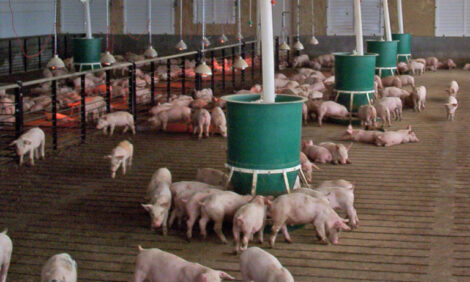



Latest Vaccine Research from PCVD Forum
As part of ongoing research and development into PCV2, a PCVD Forum was held in Athens where 350 pig veterinarians from across Europe exchanged information and views on Porcine Circovirus-associated diseases (PCVD).Veterinary surgeon Jake Waddilove from Eastgate Veterinary Group in Suffolk, UK, who attended the PCVD Forum and presented a paper on 'Management of PCVD in Fattening Units', highlights what he believes were some of the key issues.
"Two factors to come out of the Forum were the specific benefits sow vaccination can provide; particularly protection of piglets from day one, and improved reproductive performance.
"The risk factors for a piglet developing PCVD were shown to include the high susceptibility of young pigs under six weeks of age to PCV2 challenge, the exposure of piglets to high levels of PCV2 at this stage and poor levels of transfer of maternal immunity to PCV2 to the piglet. In controlling these risk factors sow vaccination with Circovac was shown to have an important role.
"Firstly, vaccinated sows shed less PCV2 virus than unvaccinated sows, and piglets from vaccinated sows shed less PCV2 than others. Both of these effects reduce the level of challenge of PCV2 to other young piglets.
"Secondly, Circovac leads to protection of the piglet in a unique way. What is new to many vets and farmers is that immune transfer in pig colostrum is not just via maternal antibody transfer but also by the transfer of immune cells very early in the piglet's life. These cells pass through the piglet gut wall, but only if they have come from the piglet's biological mother.
"With Circovac vaccinated sows both maternal antibodies and PCV2-specific maternal immune cells are transferred to the piglet. These combine to protect the very young piglet against PCVD but also have a positive impact on the development of the piglet's own immune response to later PCV2 challenges. This means that immunity derived from Circovac has a long term benefit on the piglet's defences against PCV2 and later PCVD.
"An excellent literature review highlighted the progress in understanding the impact of PCV2 on reproductive performance. Research has been shown PCV2 to be sometimes present in semen and being capable of causing reproductive problems when transmitted by semen. Transplacental infection occurs and the virus can affect embryos and foetuses at all stages. In the field there are increasing documented reports of varying reproductive problems. These often include mummified piglets and increased stillbirths but we can also see abortions, longer returns to oestrus and increased preweaning mortality. There are now a growing number of farms where Circovac vaccination has significantly improved these reproductive parameters.
"Four veterinarians then provided detailed case studies on the impact of Circovac use in four different countries with differing disease profiles and management systems. The benefits of the vaccine were profound and widespread. Used as a sow vaccine it had major impacts on PCVD from weaning to slaughter. This included a case where a 4000 place finisher herd receiving pigs from vaccinated sows at 45 kg saw a reduction in mortality of more than two per cent and medication costs reduced from £0.36 pence to £0.03 per pig. On many of the units described, the main problem had been respiratory disease with PCV2 causing major problems. Other control methods had failed but sow PCV2 vaccination led to disease control, improved performance and reduced medication.
"In another case sow vaccination led to the reduction of ileitis in the finishing herd after Lawsonia vaccination had proved unsuccessful (possibly relating to an interaction between PCV2-generated Granulomatous Enteritis and Lawsonia infection).
"Combined sow and piglet vaccination and just piglet vaccination were also demonstrated. On a 2,250-sow farrow-finish unit in Poland, the benefits of both protocols were compared with just sow vaccination. In the acute phases, the sow and piglet vaccination provided good improvements in birth to slaughter mortality, growth rates and feed conversion. However, sow vaccination alone provided equally good results and the farm was looking to using this on its own for long term protection, stating that it provided good protection up to the end of the finishing period.
"To summarise, the Forum provided veterinarians with an excellent update on PCVD research and the control of PCVD in the field. They had to grasp new concepts of immune modulation and the role of cellular transfer in colostral immunity. The benefits of sow and piglet vaccination against PCV2 were demonstrated clearly including reproductive benefits and the impact of sow vaccination throughout the finishing period."
Further Reading
| - | Find out more information on Porcine circovirus-associated diseases (PCVD) by clicking here. |
July 2009









